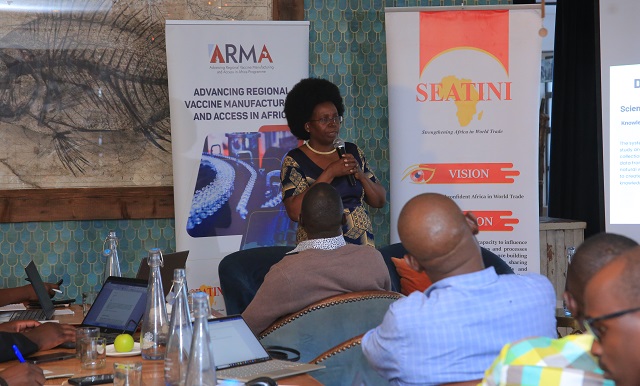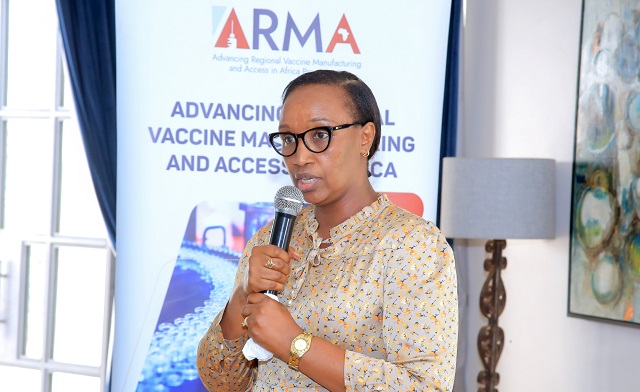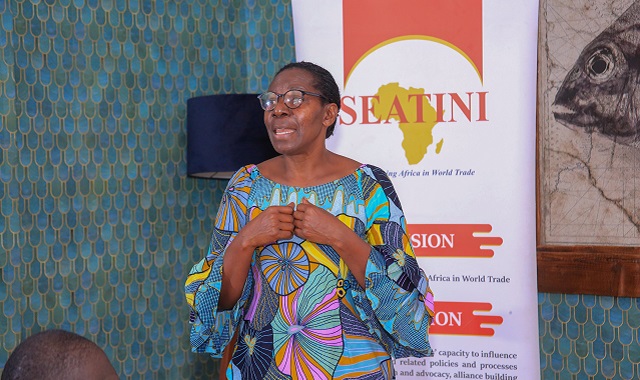
Kampala, Uganda | THE INDEPENDENT | Civil society organizations, government representatives, and the private sector convened at a high-level policy symposium in Kampala on September 27-28 to address the critical issue of pharmaceutical production and access in Africa.
The symposium aimed to explore ways to increase local production, reduce dependence on imports, and improve access to drugs and vaccines.
Rangarirai Machemdze, the coordinator of SEATINI Southern Africa, highlighted the stark reality that although Africa constitutes over 25% of the global pharmaceutical market, it produces only 2% of the drugs it consumes.
He said the continent’s annual expenditure on pharmaceutical imports exceeds $14 billion, creating a significant health and economic burden.
“Africa’s reliance on imports extends to vaccines, with the continent consuming 1.3 billion vaccines annually, representing 25% of global demand,” he said.
“Shockingly, only 1% of these vaccines are manufactured locally, emphasizing Africa’s dependence on foreign sources for 99% of its vaccine needs.”
So, how can this trend be reversed? Machemdze proposes leveraging the African Continental Free Trade Area (AfCFTA) to address this challenge.
He emphasizes that AfCFTA member states grants patents for inventions in a way that ensures access to essential healthcare products, including medicines and vaccines.
He also advocates for the ratification of the 2005 Protocol Amending the World Trade Organization (WTO) Agreement on Trade-Related Aspects of Intellectual Property Rights to facilitate pharmaceutical exports produced under the compulsory license for the benefit of state parties that have limited or no domestic pharmaceutical manufacturing capacity.
Similarly, Dr. Monica Musenero, the Minister for Science, Technology and Innovation in Uganda, stressed the importance of reconfiguring university curriculums to include drug and vaccine production.
She urged African countries to complementing each other in medicine and vaccines production rather than compete with each other to achieve economies of scale and meet demand sustainably.

The symposium, part of the “Advancing Regional Vaccine Manufacturing and Access in Africa (ARMA)” project led by SEATINI Uganda in partnership with Afya na Haki (Ahaki), seeks to address the challenges highlighted during the COVID-19 pandemic. The project aims to advance regional vaccine manufacturing and enhance access across African countries.
COVID-19 exposed vaccines gaps in Africa
The unequal distribution of COVID-19 vaccines globally underscored Africa’s vulnerability to global medical supply systems. The consortium argues that pharmaceutical companies, often known as “Big Pharma,” restrict access to patent rights and control prices, making their products inaccessible to many especially in developing countries.
The consortium partners, spanning various African countries, are working towards demystifying the belief that African nations cannot hold Intellectual Property Rights in drug and vaccine production. The consortium emphasises the importance of waiving Trade-Related Aspects of Intellectual Property Rights (TRIPS) protections to boost local production.
Despite Africa’s heavy disease burden, less than 1% of the continent’s vaccine needs are met by locally manufactured products. The consortium acknowledges numerous constraints such as unfavorable policy frameworks, inadequate financing, limited capacity, and poor collaboration.
In light of these challenges, the East African Legislative Assembly plans to pass the EAC Pharmaceutical Bill, 2020, by June 2024 to facilitate pharmaceutical industry growth in the trading bloc, according to Francine Rutazana, a member of the East African Legislative Assembly.
Rutazana said the proposed law aims to establish common standards, mutual recognition standards for medicine registration, and collaboration among pharmaceutical companies.

Jane Nalunga, the executive director at SEATINI Uganda said there’s need for a permanent solution to ensure access to medicines and vaccines, promoting health security for all citizens in Africa.
The African Union’s Partnership for African Vaccine Manufacturing Framework for Action aims to enable Africa to manufacture 60% of its vaccine needs locally by 2040.
 The Independent Uganda: You get the Truth we Pay the Price
The Independent Uganda: You get the Truth we Pay the Price


